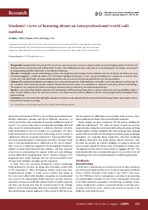Students’ views of learning about an interprofessional world café method

View/
Date
2016Author
Filies, Gerard C.
Yassin, Zeenat
Frantz, Jose M.
Metadata
Show full item recordAbstract
BACKGROUND. Interprofessional education (IPE) and practice were conceived as a means to improve quality of care by bringing together the health and
social professions to learn and work collaboratively in teams. This collaboration in turn would assist in overcoming negative stereotypes, and promote
an understanding and value of the roles of the different professions.
OBJECTIVE. To highlight a specific methodology to advance the interprofessional learning of senior students across five disciplines. By sharing the views
of students engaged in a world café model of IPE, the authors highlight this strategy as a new concept in instilling core competencies in students. This
in turn may assist other higher education institutions in their own processes of creating interprofessional curricula opportunities.
METHODS. The participants included senior students from university departments of physiotherapy, oral health, social work, pharmacy and nursing. At
the conclusion of the world café sessions, students evaluated the process by means of a questionnaire, using associative group analysis methodology.
The responses were analysed into themes according to questions posed to students in an evaluation questionnaire.
RESULTS. It was evident that students understood the terminology of IPE and learnt from others in terms of their roles and responsibilities within a
team. Overall, students valued the experience; however, they emphasised the need for additional authentic learning opportunities throughout their
student training.
CONCLUSION. It is evident that although higher education institutions create opportunities for interprofessional learning, similar opportunities need to
be provided in the practice setting.
